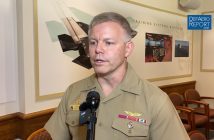Adm. Manfred Nielson, German Navy, NATO’s deputy Supreme Allied Commander Transformation, discusses the alliance’s recent exercises in Albania and Georgia, building capability development capabilities, and improving civil-military integration to address security challenges with Defense & Aerospace Report Editor Vago Muradian. The interview was conducted at the NATO Engages conference sponsored by the Atlantic Council, the German Marshall Fund, the Munich Security Conference and other think tanks in Washington, DC, to mark the 70th anniversary of NATO that founded by the Washington Treaty on April 4, 1949, with 12 nations that has grown to 29 nations today.
Vago Muradian: Welcome to the Defense and Aerospace Report. I’m Vago Muradian here in Washington, DC at the NATO Engages Conference, one of the more important gatherings as the Alliance looks to celebrate its 70thAnniversary on April 4, 1949 when nations came together in the face of the Soviet Union to establish a collective defense network — 12 nations in that original group.
This event is cosponsored by the Atlantic Council of the United States, the German Marshall Fund and the Munich Security Conference, the legendary conference known by many still as the Wehrkunde Conference.
We’re honored to have with us German Navy Admiral Manfred Nielsen who is the Deputy Supreme Allied Commander Transformation. Sir, it’s a pleasure seeing you again. It was great to see you in December down in Norfolk at the Chiefs of Transformation Conference. You had a great panel discussion. You were talking about threats, novel forms of threats, but also a bit of the future of the Alliance.
There have been a lot of people who are less than optimistic here on the 70thAnniversary of the Alliance, but you struck a very positive message. Why are you so positive about the future of the alliance at this point given how many people are concerned about the challenges, the challenges from the American President and the administration, some of the events that are going on in Europe. Why are you so optimistic about the future of the Alliance?
Admiral Manfred Nielsen: I think NATO is the most successful organization worldwide. So today we are celebrating, or as the people say here, we are rocking NATO at the 70thAnniversary. And the old lady, I would say, is still young. Many nations are looking forward to become a member of NATO, and we went to deep valleys, we climbed on huge mountains, but NATO is still vital, and that makes me optimistic for the future.
Mr. Muradian: Obviously it’s grown to 29 nations. It’s going to be 30 nations soon with North Macedonia getting ready to enter the Alliance.
You just came back from military exercises in Albania and Georgia. Talk to us about how, we oftentimes forget about the smaller exercises that are happening on the peripheries of the Alliance. We tend to focus more on the Trident Junctures and things like that. Talk to us a little bit about why that exercise was so important.
Admiral Nielsen: If you are aware, in the future I can’t see any exercise, any operation without partners. And Georgia is, for instance, one of these partners. Georgia’s looking forward to become some day member of NATO. But Georgia is supporting NATO already today in Afghanistan, in the Mediterranean, and even in Mali. So this support by these partners is beneficial for NATO, and that’s why I believe these small exercises is an investment into the future to build up interoperability and trust.
Mr. Muradian: One of the new assignments for the command is to really be the requirements and capabilities developer. That was decided at the last NATO summit. When we spoke in December you were getting ready to go into that implementation process. Bring the audience up to speed on where you are on that process, because you’re establishing all the machinery both on the military, the civilian commercial but also the civilian NATO side. Talk to us about the new organization.
Admiral Nielsen: We have to rebuild the organization, Allied Command Transformation, totally. We believe in the future we should not use the term transformation because it’s not understandable. We think we are a warfare development command for NATO. That means we take care about the capability requirements of NATO.
You are aware NATO does not own ships, tanks and airplanes, but NATO-owned capabilities are, for instance, logistics, command and control. And when we are talking about the 360 degree view, as I said already, we have to cooperate with partners outside the military and that’s important to build a communication and awareness, and that is an ongoing process. It will take, of course, some time because we have to replace people with a training and exercise background by people who are much more familiar with the capabilities.
Mr. Muradian: One of the points you made, which was an interesting point, is that we oftentimes in militaries and even leadership, have a tendency of focusing much more on the kinetic side than actually all of the softer side. You said that, for example, in Africa, you’ll have much more to learn from the Red Cross, for example, than even your own intelligence networks.
Talk to us about the kinds of partnerships that will be necessary and how military leaders have to change how they think about problems, and even their civilian leadership has to think about problems. You can argue the kinetic threat from Russia is not as serious, for example, as the information cyber hybrid operations threat that’s coming from Moscow, for example.
Admiral Nielsen: So fighting against the kinetic strike is one of our core business in NATO and will remain. But times have changed.
After the Cold War NATO decided to have a 360 degree view. That means we are not only focused on the East, but even at the same time on the South Mediterranean with a focus on Africa, or upcoming the Arctic where the ice is melting. We will see what’s going on. And therefore, I think we need different partners because the awareness of NATO, of course is kinetics, but when we are talking about future trends and which companies are owning these solutions, then we have to escape a little bit out of the fenced community, defense industry, budget guys and military, and we have to be open minded to those who have much more awareness.
I’m mentioning the African continent. What are possible threats emanating from Africa? It’s, for instance, migration. It’s, for instance, lack of water. It’s, for instance, diseases. I think other organizations like the Red Cross but not only have much more awareness about the roots of threats, and we have to keep in touch with these organizations in order to be prepared for future wars.
Mr. Muradian: Everybody has been talking about cyber. Palantier was part of that discussion, obviously a company that is engaged in cyber and the information space. NATO has been working to increase cyber capabilities. How much more work is necessary? Because if you look at it, Bob Neller, the Commandant of the United States Marine Corps, General Neller, has been very clear. He said look, there’s been a full war going on in cyberspace now for a decade. If you look at it from an intrusion standpoint, election meddling, whether it was Brexit or European elections, even Germany has experienced a little bit of that. Certainly France, Netherlands. Is the Alliance doing enough? And does it have to change how it thinks about this critical requirement that’s integral to every single thing it does from phase zero all the way up to four?
Admiral Nielsen: First of all, yes, we started to do more because when we talked about cyber the first time on a NATO Summit it was already 2002 and [PAC]. Then it took us 14 years to decide cyber as a domain. But when we are talking on cyber, I think it’s a misunderstanding that this is only a military issue. I am deeply convinced cyber will have much more impact on the civilian side. Let me express why.
When I was young and I went to the local bank, 70 percent of the people were engaged in customer services. Nowadays 70 percent are engaged in protecting data which is nothing else than cyber.
Mr. Muradian: A big problem, and I completely agree with you. You can’t have cyber defenses, for example, on a governmental and military side without having actually as strong if not stronger, I mean if you look at it, the data intrusions in the United States. Some of these hackers are getting hotel data because it’s personal information on each person.
Admiral Nielsen: Yeah. You can’t forget that there is an opportunity when we are talking about Apple’s, Google’s, Amazon’s, whatever. They have access to our personal data. They know exactly where we are booking our hotels. They know exactly what kind of food we prefer. And so on. So it’s already a technology we appreciate to use in civilian life. Look at your cell phone. You appreciate to Google when you are in a meeting, any information. I think then it’s obvious to think about how to adapt the technology with all opportunities, advantages, as well as risks in the military environment. But for me, once again, I would repeat, therefore cyber is a comprehensive approach necessary which doesn’t end at the borders. Because cyber is, a future cyber attack may be not located or dedicated to a special area or location of a special country. That’s the big challenge.
And look what happened a couple of months ago in the United States, the cyber attack on the hospital. It has had a lot of impact in the public discussion.
So I think NATO is doing more. We didn’t build a new Cyber Command because we are convinced we are competing for qualified people with all parts of our societies and let’s do it together. I think that’s the right approach.
Mr. Muradian: Let me ask you one last question. There are folks at this conference, it’s an all-day event. An extraordinary number of speakers and a lot of talent there including yourself. Again, industry, think tankers. And one of the things I picked up from the younger generation of NATO supporters is, you old-timers are worrying more about the future of the Alliance than we are. We are more confident about the future. And you’ve made the point that actually if you could get rid of half of your staff and replace them with younger people, no criticism to older people, you would.
But talk to us on the dynamic. Do you think there is a generational divide? And then maybe the old-timers are too worried and the younger guys have it right? Or are the younger guys unnecessarily optimistic that something that’s always existed will always be there. Whereas for our generation it’s a little less certain.
Admiral Nielsen: First of all, I think we have to consider, we were young a couple of decades ago, and we believed already, okay, we have better solutions. But to be honest, when I’m looking forward in an era of big data. When I’m looking forward in an era of social media. When I’m looking forward in an era of artificial intelligence, big data and so on, these young people are used to deal with this. We, the older ones, for instance myself. I grew up in the Cold War. These new technologies was not in my focus. And now I’m, of course, routine enough to obey the existing rules, regulations and procedures. And perhaps these young guys offer us the opportunity to tear down existing mental walls.
And once again I repeat myself, for me it’s always a privilege to work together with young people. The solutions they offer are sometimes surprising, and I ask myself hey, why are you so stupid that you couldn’t get rid of this special topic?
Mr. Muradian: But do you think that they’re right in being so optimistic about the future of the alliance because an older generation says don’t get too comfortable because it’s something that you always have to work on. It’s like a family or relationship that always requires effort.
Admiral Nielsen: I totally agree. There are no easy solutions. But to look from different angles, from different perspectives on a problem offers you better solutions. I think this fresh view of the young generation on these topics, because they are the future, not we, is really appreciated by myself and pushes us forward. Otherwise we will stay in our comfort zones which is not the best solution in a world which is currently really more confusing many people than bringing confidence.
Mr. Muradian: About the future of the Alliance, are they misguided in their excess optimism? That’s the question. Because when you talk to the younger folks, they talk to us older folks and say hey, you guys get really too wound up about the future of the Alliance. It’s going to be great. Do you think that on that point they’re right, and all of us who are worried about the future of the Alliance are maybe over-worrying?
Admiral Nielsen: I think the truth is somewhere in the middle. I think the younger generation has to understand that Cold War, which is our generation facing, is different from the future. The world has changed. Cold War was easy to handle because we had only one enemy — the line of defense was clearly defined. But when we are now talking about a 360-degree view, we have different kind of threats. In the past, as I said already, kinetics was our core business and will still remain an important issue. But migration, climate change, strategic communication, social media. These are threats we have to face and that’s why I appreciate to get the support and the fresh view from the younger generation.
Mr. Muradian: Admiral Manfred Nielsen of the German Navy, the Deputy Supreme Allied Commander Transformation, always a pleasure, sir. Thank you so much.
Admiral Nielsen: Thank you. It’s a pleasure. And good luck, and enjoy the 70thAnniversary. Thank you.
30




